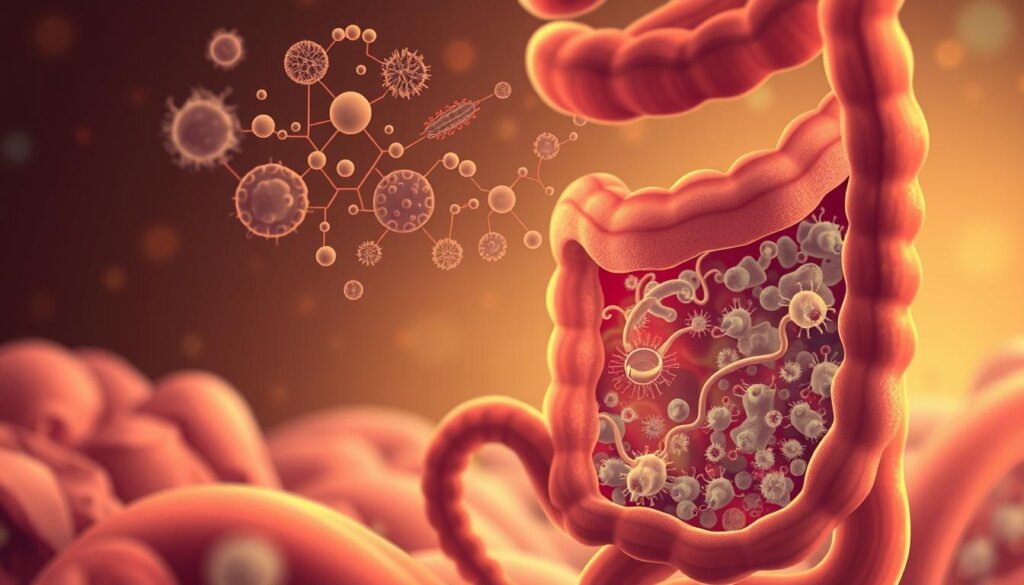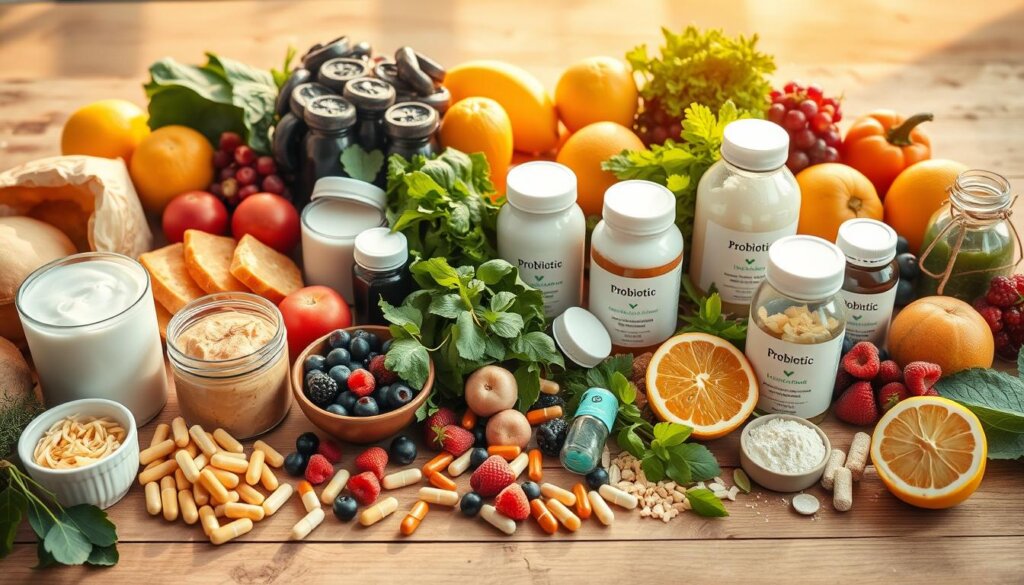Could tiny organisms hold the key to better health? This question drives growing interest in probiotics, the friendly microbes reshaping modern wellness practices. Wellness Group’s experts explain how these living allies work naturally within the body to enhance physical functions and combat imbalances.
Trillions of microorganisms inhabit the human system, forming a complex ecosystem. While some germs cause harm, others—like probiotics—actively protect against threats. Research shows they strengthen digestion, immunity, and even mental clarity when consumed in proper amounts.
Wellness Group emphasizes that not all microbes are enemies. Beneficial strains such as Lactobacillus and Bifidobacterium crowd out harmful bacteria, creating a balanced internal environment. This natural defense system explains why fermented foods like yogurt and kimchi have been trusted for centuries.
Modern lifestyles often disrupt microbial harmony, making probiotic-rich diets or supplements essential. As Malaysians increasingly prioritize preventive care, understanding these live microorganisms becomes critical for informed health choices. Wellness Group’s evidence-based insights cut through myths, offering clarity on how probiotics contribute to lasting vitality.
Key Takeaways
- Probiotics are live microbes that support bodily functions when consumed adequately.
- The human body hosts trillions of microorganisms, both beneficial and harmful.
- These “good” bacteria help control dangerous germs and strengthen natural defenses.
- Probiotics play a growing role in modern healthcare due to their diverse benefits.
- Wellness Group provides trusted guidance to navigate probiotic options effectively.
Introduction to Probiotics and Their Role in Overall Wellness
The story of probiotics is as old as human civilization itself, rooted in ancient dietary practices. While modern science gave these microbes their name, cultures worldwide instinctively harnessed their power through fermented foods long before microscopes existed.
Definition and Historical Background
Early 20th-century researchers made a breakthrough discovery: specific live microorganisms could improve digestion. This marked the birth of probiotic science. These beneficial bacteria work like microscopic gardeners, nurturing the body’s internal ecosystem.
Historical records show Korean kimchi and European sauerkraut weren’t just preservation methods. They delivered active cultures that supported health for generations. Today’s definition focuses on strains that survive digestion to colonize the gut effectively.
How Live Microorganisms Benefit the Body
Probiotics act as natural peacekeepers in the body. They crowd out harmful germs while producing compounds that strengthen intestinal walls. This dual action explains their role in reducing inflammation and allergy risks.
Emerging studies reveal wider impacts. Certain strains communicate with immune cells, helping the body distinguish real threats from false alarms. Others produce neurotransmitters that influence mood regulation – a gut-brain connection Malaysians find increasingly relevant.
Wellness Group notes that consistent probiotic intake creates resilient microbial communities. These living allies adapt to lifestyle changes, making them valuable partners in Malaysia’s tropical climate where digestive challenges are common.
What is the basic concept of probiotics?
Imagine your gut as a thriving marketplace where trillions of microorganisms negotiate for space and resources. This delicate ecosystem relies on beneficial bacteria to maintain order and prevent hostile takeovers by harmful strains.

Understanding Live Microorganisms and Their Functions
Probiotic bacteria act like skilled diplomats in this microbial world. They neutralize threats through two key strategies: crowding out dangerous germs and altering gut chemistry. By maintaining optimal pH levels, they create unfavorable conditions for pathogens while supporting digestion.
Different types of probiotics specialize in unique roles. Some break down complex nutrients, while others train immune cells to recognize genuine threats. This division of labor keeps the entire system running smoothly.
| Probiotic Type | Primary Function | Common Sources |
|---|---|---|
| Lactobacillus | Acid production | Yogurt, fermented foods |
| Bifidobacterium | Fiber digestion | Kefir, aged cheeses |
| Saccharomyces | Infection control | Nutritional supplements |
Regular consumption helps beneficial microorganisms maintain numerical superiority. This population advantage allows them to outcompete harmful strains for nutrients and attachment sites. Malaysians living in humid climates particularly benefit from this natural defense mechanism.
Understanding these functions helps individuals choose probiotic-rich foods or supplements wisely. Whether through tempeh, kimchi, or quality capsules, supporting microbial balance remains key to lasting wellness.
Exploring the Health Benefits of Probiotics
Modern science continues to uncover how these microscopic allies transform human wellness. Beyond basic digestion support, probiotics deliver multi-system advantages that make them essential for Malaysians navigating tropical climates and busy lifestyles.
Impact on the Gastrointestinal Tract and Digestion
Probiotics act as master regulators in the digestive system. They break down complex carbohydrates and fats, easing bloating and discomfort. Studies show specific strains reduce diarrhea duration by 25% in adults, particularly useful during foodborne illness outbreaks.
These bacteria reinforce intestinal walls like microscopic bricklayers. A stronger gut lining prevents toxins from leaking into the bloodstream – a process linked to chronic inflammation. Regular consumption helps maintain bowel regularity, crucial for those managing IBS symptoms.
| Digestive Benefit | Mechanism | Common Strains |
|---|---|---|
| Nutrient Absorption | Enzyme production | Lactobacillus |
| Diarrhea Prevention | Pathogen blocking | Saccharomyces |
| Gut Lining Repair | Mucus stimulation | Bifidobacterium |
Enhancement of the Immune System and Overall Well-being
Seventy percent of the immune system resides in the gut. Probiotics train defense cells to distinguish threats from harmless substances. This reduces unnecessary inflammation while improving response to genuine dangers like flu viruses.
Research highlights broader health benefits beyond immunity. Certain strains produce mood-boosting neurotransmitters, while others combat vaginal yeast infections. Their anti-inflammatory effects may ease eczema and psoriasis when used consistently.
For those seeking three key health benefits, probiotics offer digestive support, immune reinforcement, and systemic balance. As Malaysians face unique environmental challenges, maintaining microbial harmony becomes vital for lasting vitality.
Probiotic Sources: Foods, Supplements, and Safe Practices
From ancient fermentation techniques to modern encapsulation methods, probiotic-rich options now cater to diverse preferences and lifestyles. Malaysians can choose between traditional dishes and scientifically formulated products to support their gut health.

Natural Sources and Fermented Foods
Fermented foods remain nature’s probiotic powerhouses. Yogurt and kefir deliver Lactobacillus strains proven to survive stomach acid, while kimchi and tempeh offer plant-based alternatives rich in diverse bacteria. These age-old staples provide live cultures alongside essential nutrients like vitamin K and fiber.
Non-dairy options shine for those avoiding lactose:
- Kombucha: Tangy tea loaded with yeast and bacteria
- Natto: Sticky fermented soybeans with Bacillus subtilis
- Pickles: Brined cucumbers retaining crisp texture and microbes
Choosing Quality Dietary Supplements
When foods fall short, supplements offer concentrated microbial support. Look for capsules listing strain-specific Lactobacillus or Bifidobacterium with CFU counts above 1 billion. Storage matters – some products require refrigeration to maintain potency.
Key markers of reliable probiotic supplements:
- Third-party certifications (GMP, USP Verified)
- Clear expiration dates and storage instructions
- Transparent strain identification
Men seeking targeted support might explore acidophilus benefits, a strain shown to enhance nutrient absorption. Always consult healthcare providers when combining supplements with medications.
Wellness Group's Expert Insights and Practical Considerations
Effective probiotic use isn’t one-size-fits-all—it’s about strategic integration into your lifestyle. While these beneficial microbes offer numerous health advantages, their success depends on proper implementation tailored to individual needs and gut conditions.
Incorporating Probiotics into Your Daily Routine
Starting with small doses helps your stomach adapt while minimizing temporary side effects like gas or bloating. Wellness Group recommends these practical steps:
- Pair probiotic-rich foods or supplements with meals to enhance bacterial survival
- Track changes in digestion, energy levels, and immune response
- Adjust strains based on specific health conditions through professional guidance
Consistency proves vital since most probiotics work temporarily in the gut. “Daily replenishment supports microbial growth and nutrient processing,” explains a Wellness Group nutritionist. Those managing chronic diseases should consult experts before starting any regimen.
Contact Details and Business Hours
Personalized advice makes all the difference. Reach Wellness Group’s specialists via WhatsApp at +60123822655 during these hours:
- Monday-Friday: 9:30 AM – 6:30 PM
- Saturday: 10 AM – 5 PM
- Sunday: Closed
Their team helps people navigate probiotic options while addressing concerns about potential effects on unique microbiome profiles. Whether optimizing nutrients absorption or strengthening gut defenses, professional support ensures safer, more effective results.
Conclusion
Harnessing the power of beneficial microbes marks a new frontier in preventive health. These living allies work through multiple biological pathways, supporting everything from nutrient absorption to immune responses. Research confirms their role in maintaining balanced microbiome ecosystems, particularly in Malaysia’s climate where digestive challenges thrive.
Diverse types of probiotics – including Lactobacillus and Bifidobacterium – address specific needs like skin vitality or digestive tract comfort. While most people experience beneficial effects, temporary gas or mild diarrhea may occur during initial use. Monitoring reactions helps identify suitable strains.
Probiotics, as explained by Cleveland Clinic experts, create beneficial effects on human health by reinforcing gut barriers and training immune cells. Their synergy with the body’s natural systems makes them valuable for long-term wellness strategies.
Choosing quality products requires attention to strain specificity and storage conditions. Consistent use amplifies results, whether through fermented foods or targeted supplements. As science uncovers new applications – from mental health support to metabolic regulation – these microbes continue redefining modern healthcare approaches.
Ultimately, nurturing gut health lays the foundation for whole-body resilience. By partnering with these microscopic guardians, Malaysians gain a practical tool for thriving in today’s fast-paced world.
FAQ
How do probiotics support the immune system?
Probiotics interact with gut-associated lymphoid tissue, strengthening immune responses. They help balance gut bacteria, reducing harmful pathogens and promoting antibody production for better defense against infections.
Can probiotics improve skin conditions?
Emerging research links gut health to skin wellness. Probiotics like Lactobacillus strains may reduce inflammation, ease acne, and support eczema management by enhancing gut-skin axis communication.
Are fermented foods enough for probiotic intake?
Yogurt, kefir, kimchi, and sauerkraut provide natural live cultures. However, strain diversity and concentration vary. Supplements like Culturelle or Renew Life offer targeted doses for specific health needs.
Do probiotics survive stomach acid?
Many strains, such as Bacillus coagulans and Saccharomyces boulardii, resist acidic environments. Delayed-release capsules or enteric-coated supplements improve survival rates for optimal colon colonization.
Can probiotics cause side effects?
Mild bloating or gas may occur during initial use as gut bacteria adjust. Those with compromised immunity should consult doctors before using yeast-based strains like S. boulardii.
How do probiotics aid nutrient absorption?
They break down complex carbohydrates and synthesize vitamins like B12 and K2. Enhanced gut lining integrity also improves uptake of minerals such as calcium, iron, and magnesium.
Are probiotics safe during antibiotic treatment?
Studies show taking Lactobacillus rhamnosus GG or S. boulardii alongside antibiotics reduces diarrhea risk. Space doses 2–3 hours apart to minimize antibiotic impact on beneficial strains.
Do children benefit from probiotics?
Pediatricians often recommend strains like L. reuteri DSM 17938 for colic or antibiotic-associated diarrhea. Always choose age-specific products like Gerber Soothe drops.






